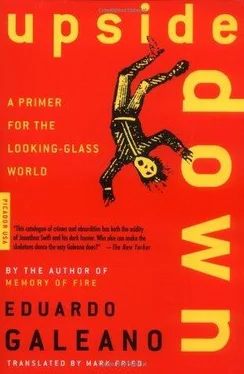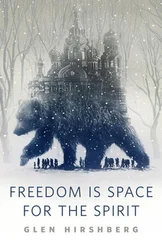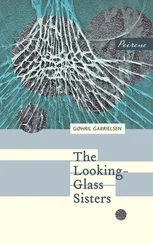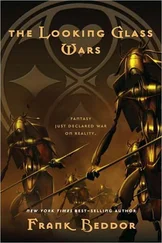



Day after day, children are denied the right to be children. The world treats rich kids as if they were money, teaching them to act the way money acts. The world treats poor kids as if they were garbage, to turn them into garbage. And those in the middle, neither rich nor poor, are chained to televisions and trained to live the life of prisoners.
The few children who manage to be children must have a lot of magic and a lot of luck.
TOP, BOTTOM, AND MIDDLE
In the ocean of desperation, there are islands of privilege, luxurious concentration camps where the powerful meet only the powerful and never, for even a moment, forget how powerful they are. In some Latin American cities where kidnappings have become commonplace, rich kids grow up sealed inside bubbles of fear. They live in fortresslike mansions or groups of homes ringed by electrified fences and guardhouses, watched day and night by bodyguards and closed-circuit security cameras. They travel like money in armored cars. They don’t know their own city except by sight. They discover the subway in Paris or New York, but never use it in São Paulo or Mexico City.
They don’t live in the city where they live. They’re not allowed to set foot in the vast hell that threatens their tiny private heaven. Beyond the walls lie regions of terror filled with ugly, dirty, envious people. They grow up rootless, stripped of cultural identity, aware of society only as a threat. Their homeland lies in the designer names on their clothes, and their language is a modern Morse code. In cities around the globe, children of privilege are alike in their habits and beliefs, like shopping malls and airports, which lie outside the realms of time and space. Educated in virtual reality, they know nothing of real reality, which exists only to be feared or bought.
Fast food, fast cars, fast life: from birth, rich kids are trained for consumption and speed, and their voyage through childhood confirms that machines are more trustworthy than people. When the day arrives for their rite of passage, they will be handed the keys to their first four-wheel-drive all-terrain corsair. In the meantime, they construct their identities by driving full speed down cybernetic highways, devouring images and merchandise, zapping and shopping. They feel at home navigating cyberspace the way homeless children do wandering city streets.
A Child’s World
You have to be very careful when you cross the street, Colombian teacher Gustavo Wilches explained to a group of children. “Even though the light is green, never cross without looking first one way, then the other.”
Wilches told the children that once he was knocked down by a car in the middle of the street. His face darkened as he recalled the disaster that nearly cost him his life. The children asked: “What kind of car was it?” “Did it have air-conditioning?” “A sunroof?” “Did it have fog lights?” “How big was the motor?”
Store Windows
Toys for boys: Rambos, Robocops, Ninjas, Batmen, monsters, machine guns, pistols, tanks, cars, motorcycles, trucks, planes, spaceships.
Toys for girls: Barbies, Heidis, ironing boards, kitchens, blenders, washing machines, televisions, babies, cribs, baby bottles, lipsticks, curlers, makeup kits, mirrors.
Long before rich kids stop being kids and discover expensive drugs to fool their solitude and shroud their fear, poor kids are sniffing gasoline and glue. While rich kids play war with laser-beam guns, street kids are dodging real bullets.
In Latin America children and adolescents make up nearly half the population. Half of that half lives in misery. Survivors: in Latin America a hundred children die of hunger or curable disease every hour, but that doesn’t stem their numbers in the streets and fields of a region that manufactures poor people and outlaws poverty. The poor are mostly children and children are mostly poor. Among the system’s hostages, they have it the worst. Society squeezes them dry, watches them constantly, punishes them, sometimes kills them; almost never are they listened to, never are they understood.
Everywhere on earth, these kids, the children of people who work hard or who have neither work nor home, must from an early age spend their waking hours at whatever breadwinning activity they can find, breaking their backs in return for food and little else. Once they can walk, they learn the rewards of behaving themselves — boys and girls who are free labor in workshops, stores, and makeshift bars or cheap labor in export industries, stitching sports clothes for multinational corporations. They are manual labor on farms and in cities or domestic labor at home, serving whoever gives the orders. They are little slaves in the family economy or in the informal sector of the global economy, where they occupy the lowest rung of the world labor market:
• in the garbage dumps of Mexico City, Manila, or Lagos they hunt glass, cans, and paper and fight the vultures for scraps
• in the Java Sea they dive for pearls
• they hunt diamonds in the mines of Congo
• they work as moles in the mine shafts of Peru, where their size makes them indispensable, and when their lungs give out they end up in unmarked graves
• in Colombia and Tanzania they harvest coffee and get poisoned by pesticides
• in Guatemala they harvest cotton and get poisoned by pesticides
• in Honduras they harvest bananas and get poisoned by pesticides
• they collect sap from rubber trees in Malaysia, working days that last from dark to dark
• they work the railroads in Burma
• in India they melt in glass ovens in the north and brick ovens in the south
• in Bangladesh they work at over three hundred occupations, earning salaries that range from nothing to nearly nothing for each endless day
• they ride in camel races for Arab sheiks and round up sheep and cattle on the ranches of the Rio de la Plata
• they serve the master’s table in Port-au-Prince, Colombo, Jakarta, or Recife in return for the right to eat whatever falls from it
• they sell fruit in the markets of Bogotá and gum on the buses of São Paulo
• they wash windshields on corners in Lima, Quito, or San Salvador
• they shine shoes on the streets of Caracas or Guanajuato
• they stitch clothes in Thailand and soccer shoes in Vietnam
• they stitch soccer balls in Pakistan and baseballs in Honduras and Haiti
• to pay their parents’ debts they pick tea or tobacco on the plantations of Sri Lanka and harvest jasmine in Egypt for French perfume
• rented out by their parents in Iran, Nepal, and India they weave rugs from before dawn until past midnight, and when someone tries to rescue them they ask, “Are you my new master?”
• sold by their parents for a hundred dollars in Sudan, they are put to work in the sex trade or at any other labor.
Armies in certain places in Africa, the Middle East, and Latin America recruit children by force. In war, these little soldiers work by killing and above all by dying. They make up half the victims of recent African wars.
Читать дальше















